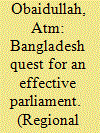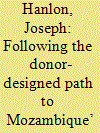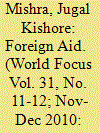| Srl | Item |
| 1 |
ID:
107303


|
|
|
| 2 |
ID:
120103


|
|
|
| 3 |
ID:
151522


|
|
|
|
|
| Summary/Abstract |
Strenuous efforts by donors and lenders over four decades turned Mozambique from a socialist success story into a neoliberal capitalist one. The private sector dominates; a domestic elite dependent on foreign companies has been created. But a secret US$2.2 billion arms and fishing boat deal involving Swiss and Russian banks and Mozambican purchases from France, Germany, and Israel, with large profits on all sides, was a step too far down the donor’s capitalist road. The International Monetary Fund cut off its programme and western donors ended budget support.
|
|
|
|
|
|
|
|
|
|
|
|
|
|
|
|
| 4 |
ID:
100404


|
|
|
| 5 |
ID:
167389


|
|
|
|
|
| Summary/Abstract |
Uncertainties about the amount of resources needed to combat climate change, dwindling local resources, limited local autonomy and limited expertise constrain local governments (LGs) in their response to the effects of climate change. As a result, financing climate change remains a major nightmare for LG actors across diverse nested territorial containers. It certainly requires the embracing of a multifaceted approach – the use of system thinking where local governments’ resource husbandry is optimised to support external aid and central government transfer. A multifaceted approach brings onboard blended resources, diverse stakeholders, diverse resource mobilisation skills and schemes, and accountability measures. Also, given projected increases in future climate-induced public expenditure, albeit with uncertainties, reliance on a single resource mobilisation approach will be a recipe for inefficiency. This article argues that developmental aid and central government’s transfer remains inadequate to meet the increasing demand for adaptation cost at the local level in Ghana. In the face of the unequivocal impact of climate change risk, we contend that local resource husbandry must be optimised through different innovations to complement other major sources of financing. Our contention resonates with the school of thought that argues local level resources are more resilient to politicisation, are stable, and are predictable compared to international aid and central government transfer. Through qualitative in-depth interviews, empirical data has been drawn from local governments in Ghana to justify our claims.
|
|
|
|
|
|
|
|
|
|
|
|
|
|
|
|
| 6 |
ID:
151489


|
|
|
|
|
| Summary/Abstract |
Based on a comparative case study of bilateral and multilateral donors, this article examines individual and institutional accountabilities among donor officers, implementing agencies, government officials and intended beneficiaries. It explores how multiple accountability demands interact, the extent to which they conflict, and how development actors mediate among them when they do. Institutionally there was substantial alignment of objectives and little goal conflict between international donors and the state; however, there was poor harmonisation across the many donors and numerous projects they were pursuing. There was greater variation within rather than between bilateral and multilateral donor chains, with perceived accountability differing more based on individuals’ positions within their organisation than by the type of organisation for whom they worked. Most informants cited multiple entities to whom they felt accountable. They more frequently acknowledged outward accountability when there existed formal accountability mechanisms, although intended beneficiary groups were conceptualised in different ways.
|
|
|
|
|
|
|
|
|
|
|
|
|
|
|
|